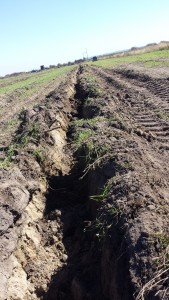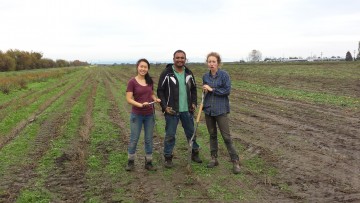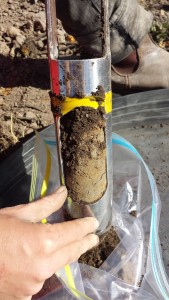Project Lead: Katarina Neufeld, Siddhartho (Sidd) Paul
Project Type: Contract
Supervisor: Dr. Sean Smukler
Project Partners: Delta Farmers’ Institute
Funder: The Climate Action Initiative’s Farm Adaptation Innovator Program
Research Overview
Delta, British Columbia is a productive agricultural region located just south of Vancouver. It is located on the productive agricultural soils of the Fraser River Delta, whose fine texture and proximity to the ocean create challenges for drainage and salinity management. Changing precipitation patterns may further compound these challenges. The objectives of this project were to: 1. Demonstrate and evaluate new on-farm strategies for addressing drainage and salinity problems; 2. Improve producer understanding of existing drainage and salinity management options, and 3. Increase producer access to drainage and salinity management information and tools and promote promising strategies.
Research/Demonstration Farm: In the fall of 2015, one field was installed with Big-O tile drains at 15, 30, or 60 feet spacing (or no drainage), and with or without cover crops. Baseline samples were collected at 0-30 cm every 40 m throughout the field, and at 0-100 cm every 120 m and analyzed for C, N, electrical conductivity, pH and texture. Soil moisture was measured approximately bi-weekly during the shoulder seasons of 2016 and 2017. Using a workability threshold calculated from clay and soil organic matter content, we modeled the number of soil workable days in the 2016 season.
Regional Analysis: We monitored twenty-six fields (15 vegetables, 11 blueberry with Big-O, Big-O and pumps, or no drainage) for ponding, soil moisture (vegetables) and water table (blueberries) every 2 weeks in the shoulder seasons of 2016 and 2017. We calculated the observed workable range for these fields in the 2016 season.
Results/Outcomes
Drain tiles were effective in reducing soil moisture, increasing soil workable days in vegetable fields, and lowering water table in blueberry fields, especially when pumps were present in ditches adjacent to the farm field. Reducing drain spacing reduced soil moisture, but changes in workable days are highly dependent on soil properties such as texture but also including soil organic matter, which can be influenced by farmers. See the full report here:



Drainage Resources
As a part of this project, we have created four fact sheets, which will also be found on the BC Agriculture & Food Climate Action Initiative website, along with other climate change resources:
- Evaluation of drain spacing and ditch pumps in existing drainage systems in Delta, BC
- Impacts of Tile Drain Cleaning Over One year in Delta, BC
- Predicting soil water content and number of workable days under changing climate using DRAINMOD model in Delta, BC
- Digital Soil Mapping of soil Workability in Delta, BC
We have also made available online interactive versions of our soil maps predicting the following properties for Delta, BC:
Video of one of our collaborating farmers highlighting their drainage challenges:
Research Assistants
The following Land and Food Systems undergraduate students have assisted with this project:
- Tom Zochowski
- Amy Norgaard
- Sarah Wong
- Kate Hengel